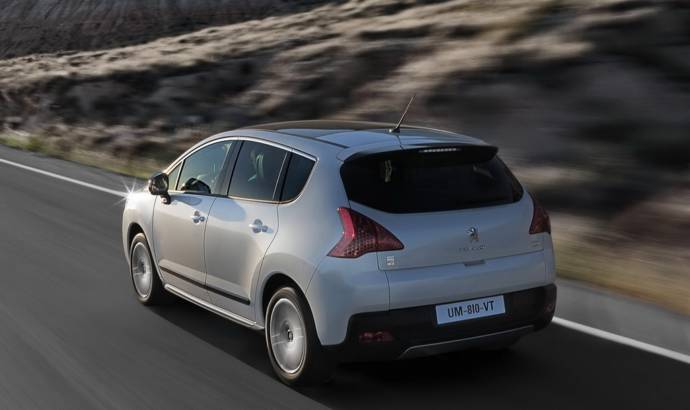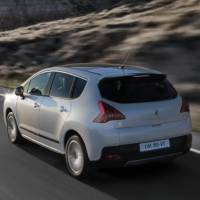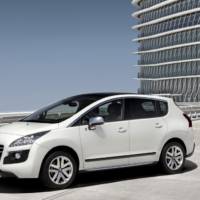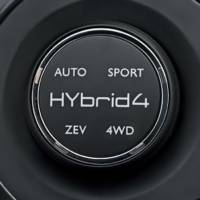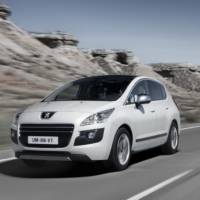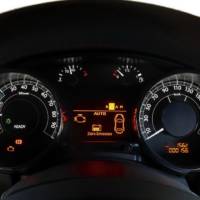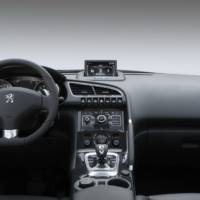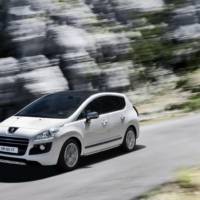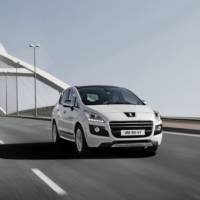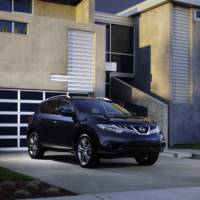The French company revealed photos and specifications with the world’s first diesel/electric hybrid, the Peugeot 3008 HYbrid4 which will premiere in Paris next month.
The Peugeot 3008 HYbrid4 uses a 2.0-litre turbo diesel packing 163 bhp to spin the front wheels plus two electric motors on the rear axle (27 bhp, 37 bhp max each). This architecture enables the Peugeot 3008 HYbrid4 to run as a for-wheel drive vehicle, with a total output of 200 HP and 500 Nm (369 lb-ft) of torque.
These figures translate into a combined fuel consumption figure of 3.8-liters per 100 Km (61.9 mpg US) Co2 emissions of 99 grams per Km and 0 to 100 Km/h acceleration times of 8.8 seconds. The Peugeot 3008 HYbrid4 has a top speed of 209 Km/h and the french crossover uses a 6-speed sequential gearbox mated with a Stop & Start system.
Other energy saving technologies featured by the Peugeot 3008 HYbrid4 include the Kinetic energy recuperation during deceleration plus the car can be driven in for different modes by operating a dial positioned on the center console. The four modes are Auto, ZEV, 4WD and Sport.
The Peugeot 3008 HYbrid4 price was not announced by market launch is expected to start across Europe in 2011.
Peugeot press release :
- Powered by a 2.0 litre 163 bhp HDi diesel engine and a 37bhp electric motor
- Potential 74.4mpg, with 99g/km of CO2
- All electric mode (Zero Emission Vehicle)
- A maximum combined power output of 200 bhp
The Peugeot 3008 Crossover, with HYbrid4 technology, is the first diesel ‘Full Hybrid’ production car in the world
By launching the world’s first diesel full hybrid vehicle – the 3008
HYbrid 4 – Peugeot will be writing a new chapter in motoring history.
The combination of a fuel efficient 2.0 litre 163 bhp HDi diesel engine
and a 37 bhp electric motor is the optimal combination for a hybrid
vehicle. Unlike previous hybrid vehicles which have chosen to use a less
fuel efficient petrol engine, the Peugeot 3008 HYbrid4’s diesel engine
provides superior Combined Drive Cycle fuel consumption of 74.4mpg, and
CO2 emissions of 99g/km.
The use of diesel hybrid technology also brings a range of other benefits:
- High performance combined with excellent driveability
- Freedom and simplicity of use with the possibility of choosing four
different operating modes: ZEV (Zero Emission Vehicle), Four-wheel
drive, Auto and Sport - Silent operation, when driving in electric only mode
- Peace of mind offered by the safety inherent in a four-wheel drive vehicle
- Environmental friendliness with CO2 emissions from 99g/km
The Peugeot 3008 Hybrid4 is designed to appeal to demanding,
technophile customers who are in search of a rewarding and original
vehicle.
In terms of performance, the Peugeot 3008 HYbrid4 benefits from the
combined power of the HDi diesel engine and electric motor during
acceleration and when an immediate surge of power is required (the
"boost" function). The maximum combined power output is 200 bhp, 163 bhp
from the 2.0 litre HDi FAP diesel engine and 37 bhp from the electric
motor. A maximum torque of 500 Nm is available, split with 300Nm at the
front from the HDi diesel engine and 200 Nm at the rear generated by
the electric motor.
To manage all the available performance a control selector mounted on
the centre console enables the driver to choose between four different
operating modes.
- “Auto” mode: the entire system is automatically
controlled, including operation of the HDi diesel engine and the
electric motor. This provides optimal driving for fuel consumption and
dynamic performance - “ZEV” mode (Zero Emission Vehicle) provides access
to an extensive all-electric mode. Activation of the HDi diesel engine
is programmed to coincide with only more sustained phases of
acceleration. This requires the high-voltage batteries to be
sufficiently charged and turns the vehicle into a “city run-around” par
excellence due to the total absence of noise and emissions. - Four-wheel drive mode (4WD) instructs both power
trains to operate together as far as possible; the rear wheels are
driven by the electric motor and the front wheels by the HDi diesel
engine. It offers peace of mind, safety, improved driveability and
accentuates the vehicle’s dynamic character. At low speed it allows
"all-terrain" capabilities equivalent to those of an SUV. The driver
will, therefore, no longer be concerned by the prospect of a slippery
track or a snowbound uphill drive to a ski resort - Sport" mode favours quicker gear changes at higher
engine speeds than normal mode. In this mode, the notion of “controlled
power” comes into its own, coupling the diesel engine with the electric
motor provides more dynamic performance, optimally distributed and
transmitted to the road by the four wheel drive for a level of stability
and driveability that will appeal to motoring enthusiasts.
With the Peugeot 3008 equipped with HYbrid4 technology, the aim is to
appeal to customers who expect both environmental-friendliness and
technological sophistication, and also genuine driving enjoyment.
Indeed, as well as the social benefit of the steep reduction in fuel
consumption, the level of performance provided by this technology will
delight even the most demanding customers in terms of road holding,
responsiveness, driveability, peace of mind regardless of road
conditions and the possibility of enjoying silent operation in town in
the all-electric mode.
HYbrid4 technology brings together Peugeot’s best technologies and
experience: HDi diesel engines, electric vehicle knowledge,
second-generation Stop & Start and electronically-controlled
sequential manual gearboxes.
The “hybrid” power train simply combines an HDi diesel engine and an
electric motor. With their exceptional efficiency, HDi diesel engines
are thermodynamically more efficient than a petrol engine and offer a
30% reduction in fuel consumption. Clearly the HDi diesel engine is the
best internal combustion engine choice.
For the “electric” component, Peugeot has historical expertise in the
field of electric vehicles. To date, the 106 Electric, marketed between
1995 and 2003, remains the world’s best selling zero emissions car (in
total nearly 10,000 vehicles were produced). At the end of 2010, Peugeot
will become the first to launch a latest-generation 100% electric
vehicle in Europe, the Peugeot i0n.
Pursuing the common sense approach of capitalising on the best
existing components and expertise, it was only natural to use Peugeot’s
electronically-controlled 6-speed manual gearbox, not only for its
engine management capabilities but also for its ability to optimise fuel
consumption. To improve performance even further a second-generation
STOP & START system is also used.
The choice of hybrid architecture was also guided by the search for
optimal efficiency and consistency. Hybrid technology uses two power
trains which can operate alternately or simultaneously:
- The HDi diesel engine operates in its most optimal operating window
on longer, out-of-town journeys. A diesel engine still remains the most
efficient and versatile choice to power any vehicle - The electric motor takes over from the HDi diesel engine in phases
of lower power demands, particularly when pulling away, driving at low
speed and decelerating (for energy recovery). These are precisely the
features that characterise urban driving
Changeover from the HDi diesel engine to the electric motor occurs
automatically, due to a STOP & START system which places the HDi
diesel engine in standby and restarts it as and when conditions require
(the operation of the accelerator pedal, low battery charge level,
etc…).
The two power sources also complement each other in certain driving
conditions ("boost" effect during hard acceleration, or when overtaking
another vehicle, for example). The performance of the HYbrid4 is
therefore directly comparable to that obtained with a single HDi diesel
engine of a much higher capacity, with good levels of responsiveness
backed by a real breakthrough in terms of reduced fuel consumption and
CO2 emissions (around 35 % less in the combined cycle for equivalent performance).
The electric motor and its ancillary equipment (inverter, converter,
etc) are fitted at the rear of the vehicle. This provides a number of
advantages not only in terms of customer benefits and it also helps
reduce costs and optimise the production process.
The original layout of the Hybrid4 system allows for the possibility
of four-wheel drive. The HDi diesel engine drives the front wheels,
while the electric motor (in the rear drive train) drives the rear
wheels.
Everything is controlled electronically ("by wire") and there are no
mechanical links between the front and the rear drivetrains. This gives
the system many advantages over a "traditional" mechanical system.
- No structural constraints affecting the layout and design within the passenger compartment
- 4×4 and environmental-friendliness are no longer contradicting terms
The installation at the rear, of all the vehicle’s “electrical components”, has further technical and economic benefits.
Firstly, it avoids the need for any major redesign of the vehicle’s
engine compartment, while also improving weight distribution. It also
leaves intact the possibility of using a range of different capacity
engines, for possible future introduction.
Secondly, this architecture is achieved by means of the use of a
simple and compact rear module containing the electric motor, its
ancillary equipment and also the rear drive train and suspension.
The costs of the rear module are, therefore, reduced because of the
technical possibility of deploying the same HYbrid4 technology into
different market segments, in different body shapes, etc…, regardless of
the type of internal combustion engine used.
A real breakthrough in terms of reducing fuel consumption and CO2
emissions, while improving dynamic performance levels, providing
four-wheel drive and an electric only mode, HYbrid4 technology brings a
number of benefits without compromises.
Furthermore, the driveability, safety and eco-efficiency of the
system are based on simple, reasonable and consistent technological
choices.
The Peugeot 3008 Crossover was chosen as the first application of this innovative technology.
The Peugeot 3008 HYbrid4 – In Detail
2.0 litre HDi FAP 163 bhp diesel engine
With a capacity of 1997 cm³, this Euro 5 engine develops a maximum power
of 163 bhp at 3750 rpm and a maximum torque of 300Nm at 1580 rpm. To
obtain this level of performance it uses Peugeot’s latest generation
ECCS (Extreme Conventional Combustion System) combustion chamber design,
a variable-geometry low-inertia turbocharger, a high-pressure injection
pump allowing a maximum pressure of 2000 bar and solenoid injectors
with eight apertures.
Naturally this is combined with the latest generation "octosquare"
Eolys additive-enhanced diesel particulate emission filter (FAP) system.
Electronically-controlled 6-speed manual gearbox (BMP6)
The HDi diesel engine is mated to an electronically-controlled manual six-speed sequential gearbox:
- In automatic mode its electronic control helps provide significant
savings in fuel consumption, compared to a traditional automatic gearbox
or even a traditional manual gearbox - It offers real driving satisfaction derived from the possibility of
choosing the gear change mode at any time – manual or automatic – with
either the gear lever or via controls behind the steering wheel
The gear change quality of the gearbox has been enhanced with HYbrid4
technology, as the rear electric motor is activated during gear changes
to improve the smoothness of the operation, and sustains drive in
between gear changes.
Latest-generation STOP & START system
This system places the HDi diesel engine in standby when the vehicle is
at a standstill (at traffic lights, a stop sign or in a traffic jam,
etc) and when the vehicle is being driven in electric-only mode. It
significantly reduces fuel consumption and emissions in urban driving
conditions while also enabling.the HDi diesel engine to be restarted
instantly and smoothly, when required.
The "high voltage" STOP & START system has a maximum output of 8
kW and can generate enough energy to supply the power requirements for
the rear electric motor if required (four-wheel drive mode).
Rear suspension
To ensure a dynamic performance on a par with Peugeot’s reputable road
holding standards, the rear electric module also includes a multi-arm
rear suspension within which are housed the electric motor and the
reduction gearbox.
ESP
The ESP system fitted to the 3008 HYbrid4 incorporates an “improved
traction control system” (ASR) able to exploit the car’s four-wheel
drive capabilities to the full on challenging surfaces. The performance
of the system can be enhanced by the fitment of optional 16’’ ‘Mud &
Snow’ tyres.
Electric motor
The synchronous permanent magnet electric motor is located at the rear
of the vehicle. It provides a constant 27 bhp, with a peak output of 37
bhp. It generates a constant torque of 100 Nm, or a peak of 200 Nm when
necessary.
PTMU (Power Train Management Unit)
The PTMU is the electronic control unit that automatically manages the
different operating modes of the HDi diesel engine and the electric
motor, programmed to optimise fuel consumption.
An inverter and a converter are used to control the electric power.
The inverter controls the torque of the electric motor by regulating the
electrical current supplied from the high-voltage battery pack. It
operates in a voltage range of between 150 and 270 volts. The converter
reduces the 200 volts from the high-voltage battery pack into 12 volts
to supply the vehicle’s onboard systems.
On the Peugeot 3008 HYbrid4 all these components have been made as
compact as possible to optimise the installation and weight effect in
the vehicle.
High-voltage battery pack
The Ni-MH (Nickel Metal Hydride) batteries are located under the boot
floor, near the electric motor. The high-voltage battery pack is in
addition to the standard 12V battery under the bonnet, which carries on
performing its normal duties.
In the medium term, this battery technology remains the most
appropriate in terms of cost and industrialisation for vehicles produced
in large volumes.
Energy recovery
An energy recovery system (the electric motor becomes a generator)
enables the kinetic energy created by the vehicle to be transformed into
electrical energy to recharge the Ni-MH batteries during deceleration
(release of the accelerator pedal and during braking). This recovery
system enables the driver to re-deploy the "free" (Kinetic) energy to
reduce fuel consumption accordingly.
Man-machine interface
A 7’’ 16/9 colour screen or a multi-function display, according to the
car’s specification, informs the driver in real time of the operating
status of the hybrid power train. It also shows, for a given journey,
operating times in different modes and the status of the battery charge.
On the instrument panel the left-hand dial indicates the percentage
of power used or recovered during phases of braking or deceleration.
Different scales indicate the battery status: Charge, Eco (optimal
operating range), Power, Boost (maximum use jointly with the HDi diesel
engine).
Suppliers
To develop its HYbrid4 technology, the PSA Peugeot Citroën Group has
teamed up with suppliers offering the best expertise in each field.
Based on the manufacturer’s technical specifications, BOSCH has provided
its expertise with respect to the electric motor, the power
electronics, the reversible high-voltage alternator / generator and
other systems managing the dialogue between these components, the
braking and trajectory correction systems (ABS and ESP). Similarly,
SANYO has provided its extensive knowledge in the field of Ni-MH
high-voltage batteries.
A distinctive design
The new Peugeot 3008 HYbrid4 is distinguished by its cutting-edge
technology, combining responsible driving and driving enjoyment, but
also by its specific styling.
At the front, Peugeot’s latest design cues have been adapted to match
the 3008’s generous dimensions and to mark a break with existing
models. The headlamps now have an integral bar of LEDs providing a
daytime lighting function and accentuate the 3008’s appearance. The 3008
HYbrid4 also proudly wears the Marque’s new Lion badge on its bonnet.
At the rear, the rear spoiler has a two-tone finish with a high gloss
black section, helping to differentiate it from the other 3008 models
in the range, as do the chrome badges which decorate the sides and rear
of the car.
Interior
Inside its roomy architecture, the driving position bears all the
hallmarks of a top-of-the-range vehicle, or even that of an aircraft
cockpit. An expansive fascia panel, controls within easy hand’s reach
and an ergonomic centre console clearly separate the territory of the
“pilot”. Combined with a raised and dominating driving position it has
everything in place to reward its drivers and offer a range of new
driving experiences not previously found in a conventional hybrid
vehicle.
Distinctive materials are deployed throughout to accentuate the
Crossover feel and explore new avenues of expression. This is true in
particular of the new and specific Guérande & Tramontane two-tone
leather finish which subtly combines bright pale grey on the seat
cushions with a black finish on the sides of the seats.
The gear lever with its modern and elegant design is a key feature of
the HYbrid4 technology. It enhances the technological ambience in the
same way as the 7’’ colour display which provides information on the
flow of energy. A specific steering wheel bearing the signature HYbrid4
adds a touch of exclusivity to the car.
“Multiflex” interior
Due to its intelligent “Multiflex” interior and clever integration of
the batteries and the innovative rear suspension, the Peugeot 3008
HYbrid4 can also be transformed to offer a considerable load capacity
under the parcel shelf of 420 litres (362 dm3 VDA), with 66 litres (29 dm3 VDA) available under the boot floor.
The split lower tailgate opens to reveal a boot with a flat floor
equipped with longitudinal securing rings that exude quality and
strength. From the boot, a rear seat folding system, controlled by
switches mounted on the load area side trims, allow the seats in the
second row to be folded automatically, ‘as if by magic’.
Combined with the folding front passenger seat, the 3008 HYbrid4
offers a perfectly flat floor from the tailgate to the fascia panel.
This frees up a gigantic 1501 litre compartment that is easy to load.
Driving aids:
Comfortably seated behind the steering wheel, drivers will note among
the equipment at their disposal certain references to the world of
aviation.
For example, to ensure that the driver never needs to take an eye off
the road ahead, and as in a jet aircraft, essential driving information
is projected onto a retractable transparent panel which cleverly
extends from the instrument panel. The Head-Up Display system can be
adjusted by means of toggle switches.
These switches, located above the centre console, add a further touch
of style to the in-car ambience. They also control another original
item of equipment – the Distance Alert system. As its name implies, this
function helps the driver to keep aware of the safe distance from the
vehicle in front, according to the 3008’s speed.
Another item of equipment that helps to ensure maximum driving
convenience is the Parallel Park Assist (PPA). This system assesses the
size of a space during parking manoeuvres and determines the possibility
of parking in it.
Similarly, the electric handbrake coupled with the Hill Assist
function, helps the driver during manoeuvres but also optimises the
interior space within the vehicle.
Finally, a latest-generation satellite navigation system helps to guide users on their travels.
The Peugeot Connect 3-D Media Navigation (NG4) includes all the
benefits of the Marque’s existing satellite navigation systems. These
include a juke-box function, linked to a hard disc, Peugeot Connect
services, GSM function, a USB connector, a DVD player, a Bluetooth®
system and a display which shows specific buildings in full 3D.
The Peugeot 3008 HYbrid4 is a Crossover with an exceptional
technological content offering unique versatility and safety, unrivalled
driving enjoyment and CO2 emissions of a very low level.
Peugeot’s choice of the diesel hybrid demonstrates that it is possible
to combine uncompromising environmental demands with driving experiences
not previously available in a hybrid vehicle.
The 3008 HYbrid4 will be produced in France (in Sochaux and Mulhouse) and marketed in the spring of 2011 in Europe.

